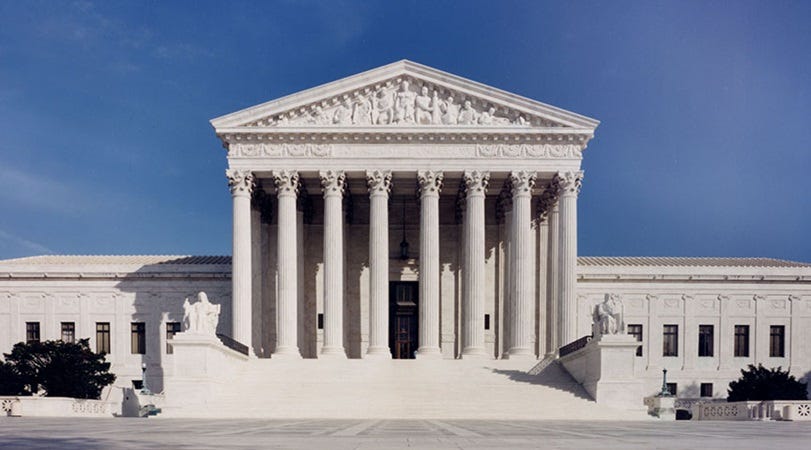An Enforceable Code of Intimidation
Joe Biden v. the Supreme Court and the Constitution
Proof positive that Joe Biden has lost his marbles came in the form of a White House announcement of the President’s plans for the remainder of his term. These included “Supreme Court reform”; that is, the emasculation of a troublesome institution that stands in the way of postmodern progressivism. Biden is expected to propose term limits for justices and an “enforceable code of ethics” for the high court. Really, he should read the Constitution of the United States—or have somebody read it to him.
In Article III, Section 1, the Constitution provides for the establishment of an independent federal judiciary:
The judicial Power of the United States, shall be vested in one supreme Court, and in such inferior Courts as the Congress may from time to time ordain and establish. The Judges, both of the supreme and inferior Courts, shall hold their Offices during good Behaviour, and shall, at stated Times, receive for their Services, a Compensation, which shall not be diminished during their Continuance in Office.
The legislative and executive branches of the federal government have certain limited powers in respect of the judicial branch: the creation of inferior federal courts, and the nomination and confirmation of federal judges. Congress also has the power to remove judges from office by impeachment in the House and conviction in the Senate. But that is all.
Since Article III, Section One stipulates that federal judges “shall hold their Offices during good Behaviour,” a constitutional amendment would be required to establish term limits for justices of the Supreme Court. Constitutional amendments must either be passed with a two-thirds majority by both the House of Representatives and the Senate or by a constitutional convention called by two-thirds of the states. Then they must be approved by three-fourths of state legislatures.
President Biden’s tenure in office expires on January 20, 2025.
Though as a practical matter such a constitutional amendment would be hard to enact, term limits for federal judges are not necessarily objectionable in principle—depending on how the required amendment is framed. But the same cannot be said of the proposed “enforceable code of ethics” for justices of the Supreme Court. For it invites an awkward question: Enforceable by whom?
The federal judiciary, with the Supreme Court at its apex, is a coequal branch of the federal government. This of course does not mean that federal judges are above the law. Like any other citizen, they may be prosecuted for criminal acts. And they can be removed from office via impeachment for “Treason, Bribery, or other high Crimes and Misdemeanors.” So on the face of things, there’s really no need for a formal code of ethics. Congress already has the power to remove unfit judges via impeachment. The powers of the judiciary, like those of the other two branches, are checked and balanced.
But it will be noticed that despite all the hysterical cries that the Supreme Court has “gone rogue,” despite the charges of bribery, and corruption hurled at the conservative justices, congressional Democrats have made no serious effort to impeach any of them. Instead, the Dems are proposing to outsource their power. The idea seems to be that a code of ethics for the Supreme Court would be passed by Congress, signed into law by the President, with its enforcement entrusted to some board or agency either existing or created for that purpose.
Clearly, however, enforcement could not be delegated to the Justice Department; nor to a congressional committee; nor to some independent body, its members nominated by the President and confirmed by Congress. That would violate a fundamental principle of our constitutional order: the separation of powers. If the checks and balances already embodied in the Constitution are indeed insufficient to police the Supreme Court, then the appropriate remedy is a constitutional amendment. Except as provided in the Constitution, the legislative and judicial branches have no power to “reform” the Supreme Court.
But Biden’s plan—the Democratic Party’s plan—really has nothing to do with ethics or good government. It is, rather, an attempt to transform the Supreme Court into a third legislative branch that would obediently rubber-stamp every progressive policy. The most straightforward means of doing so would be to “pack” the Court by enlarging its membership and filling the new seats with progressive jurists. But that would be too blatant a power grab. FDR tried it and got his fingers burned.
Placing the Supreme Court under the authority of an outside ethics board is the sly alternative. No doubt it would be chock full of progressive legal scholars and retired jurists with no qualms over using their power to exert political pressure on the justices. After all, the broad Left’s great concern with judicial ethics only emerged after the Court’s conservative majority began ruling against progressive preferences. The comrades couldn’t care less about the ethics of judges who rule their way. Their scurrilous attacks on the Court up to now show what judicial ethics really means to them: Do it our way—or else.
These considerations lead me to conclude that the Biden/Democratic plan to “reform” the Supreme Court is really just an intimidation tactic—another attempt to frighten the conservative majority out of its conservative principles. I’ll be interested to see whether Kamala Harris takes it up as a campaign issue. If she’s smart—yes, yes, I know—she’ll leave it strictly alone. It wouldn’t be a good idea to remind people that she bears a share of the responsibility for the mess created by Biden’s failed presidency.


It says something about the psychology of the Democratic party that justices actually making decisions based on the law and the constitution is described as "going rogue".
This one did seem to come out of left field. With all the swarming and drowning of the remnants of his “legacy” by his own people, why go here?